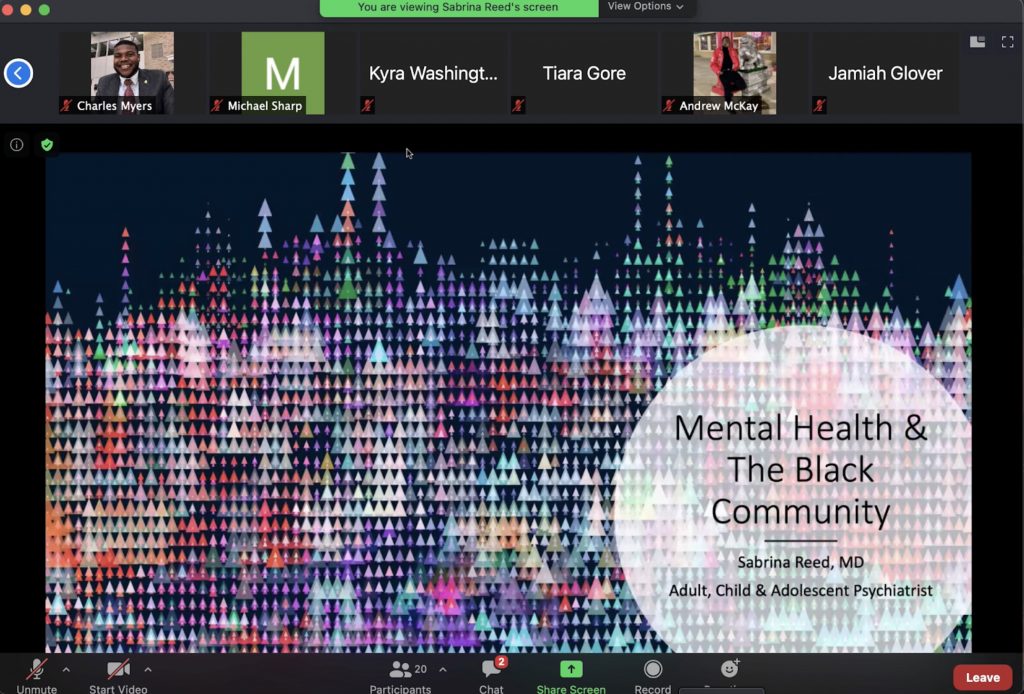
Mental health has been at the forefront of the conversation surrounding the ongoing pandemic, and members of the Bradley community recently elected to hone in on the topic’s relevance in the Black community.
On Feb. 8, Bradley’s Epsilon Kappa chapter of Alpha Phi Alpha hosted “Black Thought: Mental Health in the Black Community,” on Zoom with USC clinical assistant professor Sabrina Reed as a guest speaker. Using her background as a child and adolescent psychiatrist, Reed held a 30-minute presentation on the subject of Black mental health.
Blake Sartin, vice president of the chapter and sophomore sports communications major, was a host for the event. He described it as a response to and a break from current social tensions.
“We noticed that mental health is a huge thing to begin with, and it’s especially important in the Black community,” Sartin said. “Already, Black people are dealing with oppression, and … it’s messing up their brains and it’s really weighing down on them … We felt as if holding this event could uplift them in a way.”
Event planning took almost 3 weeks, according to Sartin, but he believes Reed offered a precious opportunity for insight.
“You could tell she definitely knew what she was talking about, and coming from a person of color, it definitely was uplifting to see,” Sartin said.
Reed began by showing a Trevor Noah video that laid out the foundation of her talk. The “Daily Show” excerpt covered systemic problems surrounding Black mental health, including an inability to find effective care and symptoms of depression being misdiagnosed as “disruptive behavior.”
The video did not rule out intrapersonal problems, as it mentioned a community-wide stigma against seeking therapy, often in favor of religious practices instead.
“Church is a great place for community, but therapy is great for one-on-one mental health needs,” Noah said.
Reed then presented an activity to those in attendance, asking them to internally rank their mental well-being on a scale from zero to 10, before her talk formally began.
While one of the presentation’s slides acknowledged that the Black American experience varies greatly, Reed used the lens of shared cultural factors to focus on stressors, misconceptions and self-help tools that members of the community could identify with.
“We have individual and collective experiences that affect us more as a community than are unique just to us,” Reed said.
Reed added that this solidarity can assist mental resilience (described by her as “psychological fortitude”) among Black people. She then expanded upon the stigma mentioned in the Noah video, showing slogans such as “men don’t cry” and “too blessed to be stressed” to indicate how this constant toughness can work more toward a disadvantage.
“This can give you the motivation to push on, but this can also be a downside,” Reed said. “The downside is that it makes it more difficult to recognize when there’s a problem.”
This point resonated with audience members, including Sartin.
“When [Black people are] dealing with stuff, they sometimes don’t want to go seek help,” Sartin said. “I wouldn’t judge; I don’t know why someone would want to judge someone who’s dealing with that because that’s a serious thing, especially in the day and age that we’re living in right now.”
According to Reed, 40 percent of college students suffer from depression, 60 percent suffer from anxiety and suicide is the second-highest cause of death, among other facts.
When speaking on the range of coping strategies available to the Black community, from exercise to drug use, Reed advised those in attendance to get proactive in healthy ways such as admitting areas of weakness, practicing self-kindness, knowing when to seek help and having a regular self-check system similar to the aforementioned 0-10 scale.
“Be honest with yourself, at least, about what that number is because the reality of it is there’s no judgment,” Reed said.
Reed ended her presentation by playing a progressive muscle relaxation video. Afterwards, she shared links to mental health resources and asked her audience to rank their well-being from zero to 10 again and consider a key takeaway from the presentation.
“What’s one thing from this … that you think you can do to build and increase your own psychological fortitude?” Reed said. “Think about what that is for you, and try to commit to it as best as you can imagine doing.”
According to Sartin, Reed’s talk will not be the last event of Bradley’s Alphas centered around mental health.
“More people need constant reassurance about these types of things because some people may forget,” Sartin said. “We definitely will plan to hold more events like this in the future.”
More news on the Alphas’ events during the semester can be found on their Instagram, Facebook and Twitter.

